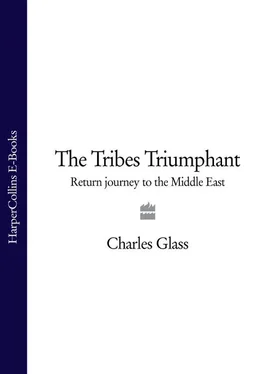Back on the deck of the Nissos Kypros , where the muzak blended with the engine’s rumbling, Juwal, Anne Marie, George and I discussed the Middle East to which we were sailing. Juwal told us a story about his father, Udi Levy. Udi Levy had demanded that the word ‘Jew’ be removed from his national identity card. In Israel, nationality did not mean citizenship. It meant racial origin. Udi Levy was proud to be a Jew, but he did not accept being defined as one by the state, especially when the state gave its Jewish citizens privileges it denied to Arabs. He fought through the courts and won. Juwal had inherited some of his father’s dissidence, refusing to serve in the army of occupation in the West Bank and Gaza. As with many other refuseniks, the military found a way to avoid prosecuting him. They let him serve in the navy. The sea was not occupied.
Where Juwal came from, kids made tougher decisions than ours had to. Some joined the army. Some ran away to other countries. Some went to prison rather than shoot Palestinian children, demolish houses and enforce a military occupation in which they did not believe. On the Palestinian side, youngsters threw rocks at tanks, ambushed settlers or committed suicide in order to kill other kids they believed were their enemies. Some Palestinian boys worked for the Israelis, as labourers in settlements or as police collaborators; others languished in Israeli interrogation rooms or prison cells.
When the Nissos Kypros reached Cyprus, my friend Colin Smith met us at Limassol port. Colin lived in Nicosia. When we met first in Jerusalem, he was the Observer ’s roving correspondent and I was working for ABC News in Lebanon. A few months later, we covered the independence war in Eritrea together with the photographer Don McCullin and Phil Caputo of the Chicago Tribune. A couple of weeks of hell in the desert with guerrillas who got us lost, denied us water and nearly left us for dead started our long friendship. Caputo went on to write novels, and Colin had collaborated with the journalist John Bierman on books about Orde Wingate, the British officer who more or less created the Israeli army, and on the battle of El Alamein.
That night, Colin, his wife Sylvia and their grown-up daughter Helena took us on foot to a Greek restaurant in an old house near the Green Line between Turkish and Greek Nicosia. The Aegean’s owner was a Greek Cypriot political fanatic named Vasso. Vasso, with a beard as long and black as an Orthodox archbishop’s, could have given lessons in political intransigence to Israeli settlers and Palestinian suicide bombers. His cause was Enosis, the union of Cyprus with Greece. The décor of his courtyard hostelry gave his politics away. Pride of place went to a huge wall map that showed Cyprus as part of Greece – not just politically, but physically, a few hundred miles closer than it is on the earth. The eastern Mediterranean was the region of creative map making. Syrian maps included Turkish Alexandretta in Syria and left a blank for Israel, a void that Syrian politicians called ‘the Zionist entity’. Many Israeli maps included Judaea, Samaria and Gaza in ‘Greater Israel’. Some Arab nationalists’ maps, based on those of the eighth century, showed an Arab state from Morocco to Iraq. A Kurdish map delineated Greater Kurdistan from the Mediterranean to Armenia and Iran.
When Colin introduced me as his American friend, Vasso said, ‘I am strongly anti-American … policy.’ The delayed ‘policy’ seemed to come out of consideration for the thousands who had died a few days before. It was clear he did not normally add it. He confessed that, despite his politics, he sympathized with Americans over the massacres. Perhaps the struggle between Christendom and Islam took precedence over his hatred of Henry Kissinger, who, as secretary of state in 1974, had supported Turkey’s invasion of the Cypriot Republic. Turkey was reacting to a coup attempt by the Greek Cypriot National Guard, whose leader, Nikos Sampson, had championed Vasso’s dream of Enosis. Since then the island had been sliced into Turkish and Greek halves. Vasso ran a good restaurant in a stone house whose style anyone but Vasso would have called Ottoman. The wine was rough, the food deliciously grilled. We stayed late, arguing politics with a band of Greek actors at another table and, as usual with Colin for almost thirty years, drinking too much. We walked home along the Green Line. Colin nearly led us into a Turkish checkpoint. That detour would be harmless in the morning, but at night a Turkish conscript might shoot.
During our week in Cyprus, while the US assembled its forces around Afghanistan, George played tennis in the mornings with Colin and I made calls to Israel, Jordan and Lebanon. The US was not bombing any Arab countries, and no harm had come to Americans in the Arab world. I could leave Cyprus for Aqaba, having kept my promise to my daughter. George flew back to London and his final year of history at SOAS. I read some Somerset Maugham short stories and came across the dictum ‘The wise traveller travels only in imagination’. I should have heeded him on my first journey through Greater Syria in 1987.
If not for Britain’s invasion and division of the Ottomans’ Arab provinces, I might not have made this journey or the one that was curtailed in 1987. T. E. Lawrence and his masters had created the conditions for the wars that I had come again and again as a journalist to report: not only the many between Israel’s Jewish colonists and the Arab natives, but between Arabs and Kurds, Christians and Muslims, Iranians and Iraqis. The empires brought border wars, where there had been no borders; tribal wars, where tribes had always lived; anti-colonial wars, where empires had always ruled over colonies.
I was a dual citizen: of the vibrant American empire and of its British predecessor, now a mere kingdom of northern Europe. Two passports and many allegiances. My ancestors had originated from subject peoples in Ireland long before its independence and from Mount Lebanon under the Ottoman Sultan in Istanbul. Both families were Catholic, one of their many legacies to me and another claim on my loyalty. Part native, part double imperialist, I would enter Aqaba from the Red Sea. Lawrence’s route had been, like the man himself, more circumspect. He had led a detachment of Arab irregulars from the Hejaz north through the desert to Wadi Roum, the rosy-rocked Greeks’ Valley in what became Jordan. Disabling Turkish batteries along the way, they struck south to surprise the Ottomans from the rear.
I could have gone that way, but that was not where the real war was fought, not where decisions were made. Lawrence’s five-hundred-mile march and the capture of Aqaba were episodes in the Arab myth of self-liberation. Reality was the British army, preparing to assault Gaza from Egypt. Reality was the Royal Navy, cutting Turkey’s communications between Aqaba and the Ottoman troops concentrated in the holy city of Medina. The naval guns of Great Britain had reduced the seaward walls of Aqaba’s Mamluke fortress, where a few hundred Turkish imperial troops sheltered for safety. Lawrence wrote of Aqaba in 1917: ‘Through the swirling dust we perceived that Aqaba was all a ruin. Repeated bombardments by French and British warships had degraded the place to its original rubbish. The poor houses stood about in a litter, dirty and contemptible, lacking entirely that dignity which the durability of their time-challenging bones conferred on ancient remains.’ By the time Lawrence reached Aqaba, it was as a walkover.
The capture of Aqaba transformed Britain’s eastern war. Captain Basil Liddell Hart wrote, in his biography Colonel Lawrence: The Man Behind the Legend , ‘Strategically, the capture of Aqaba removed all danger of a Turkish raid through Sinai against the Suez Canal or the communications of the British army in Palestine.’ In Hart’s words, it also inserted an ‘Arab ulcer’ in the Turkish flank.
Читать дальше












